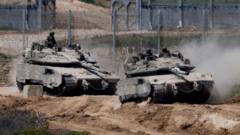As tensions rise in the Middle East, Israel's security cabinet has officially authorized a comprehensive expansion of its military offensive against Hamas, with plans to capture and hold territory in Gaza. The approval follows the mobilization of tens of thousands of military reservists as Israel seeks to increase pressure on Hamas with the aim of retrieving remaining hostages. The timing of these operations is reportedly slated for after President Donald Trump's upcoming visit to the region.
Israel's Security Cabinet Greenlights Expanded Military Offensive in Gaza

Israel's Security Cabinet Greenlights Expanded Military Offensive in Gaza
In a significant escalation, Israel's security cabinet approves a plan to increase military operations against Hamas, including potential territorial occupation.
On Sunday, Israeli Prime Minister Benjamin Netanyahu convened the security cabinet to outline strategies for an intensified ground offensive, effectively ending a two-month ceasefire that had been in place since March. The decision comes amidst urgent warnings from humanitarian organizations regarding critical food shortages exacerbated by the blockade, now approaching two months in duration.
The first phase of the operation involves expanding the Israeli-controlled buffer zones along the borders with Egypt and controlling additional areas within Gaza, a pivot from earlier raid-based tactics to a more entrenched military presence. Netanyahu characterized this approach as a necessary evolution in tactics designed to ensure Israel's safety and encourage Hamas to engage in negotiations for hostage releases.
However, opposition voices highlight the strategy's potential pitfalls, arguing that focusing on territorial control may detract from efforts to recover the remaining hostages. Critics contend that such military strategies further alienate the public and undermine support for the government. Despite the military's assurances, families of hostages express frustration at the government’s preference for "territories over people," reflecting a significant segment of Israeli society that prioritizes the safe return of hostages.
Additionally, the Israeli cabinet discussed a controversial proposal to facilitate humanitarian aid through private means, a move condemned by UN agencies who argue it violates pivotal humanitarian protocols. Concerns persist that this rerouting of assistance may lead to heightened risks for vulnerable populations.
The extensive military campaigns initiated by Israel following a historic incursion on October 7, which tragically resulted in the deaths of approximately 1,200 individuals and the capture of hundreds of others, have resulted in devastating casualties, with death tolls in Gaza now exceeding 52,000.
As the conflict escalates, the implications for both Israeli and Palestinian civilians remain dire, with the UN reiterating Israel's obligations under international law to provide necessary aid to the beleaguered population of Gaza.
Israel-Gaza conflict intensifies amidst military strategies and humanitarian challenges.
The first phase of the operation involves expanding the Israeli-controlled buffer zones along the borders with Egypt and controlling additional areas within Gaza, a pivot from earlier raid-based tactics to a more entrenched military presence. Netanyahu characterized this approach as a necessary evolution in tactics designed to ensure Israel's safety and encourage Hamas to engage in negotiations for hostage releases.
However, opposition voices highlight the strategy's potential pitfalls, arguing that focusing on territorial control may detract from efforts to recover the remaining hostages. Critics contend that such military strategies further alienate the public and undermine support for the government. Despite the military's assurances, families of hostages express frustration at the government’s preference for "territories over people," reflecting a significant segment of Israeli society that prioritizes the safe return of hostages.
Additionally, the Israeli cabinet discussed a controversial proposal to facilitate humanitarian aid through private means, a move condemned by UN agencies who argue it violates pivotal humanitarian protocols. Concerns persist that this rerouting of assistance may lead to heightened risks for vulnerable populations.
The extensive military campaigns initiated by Israel following a historic incursion on October 7, which tragically resulted in the deaths of approximately 1,200 individuals and the capture of hundreds of others, have resulted in devastating casualties, with death tolls in Gaza now exceeding 52,000.
As the conflict escalates, the implications for both Israeli and Palestinian civilians remain dire, with the UN reiterating Israel's obligations under international law to provide necessary aid to the beleaguered population of Gaza.
Israel-Gaza conflict intensifies amidst military strategies and humanitarian challenges.


















